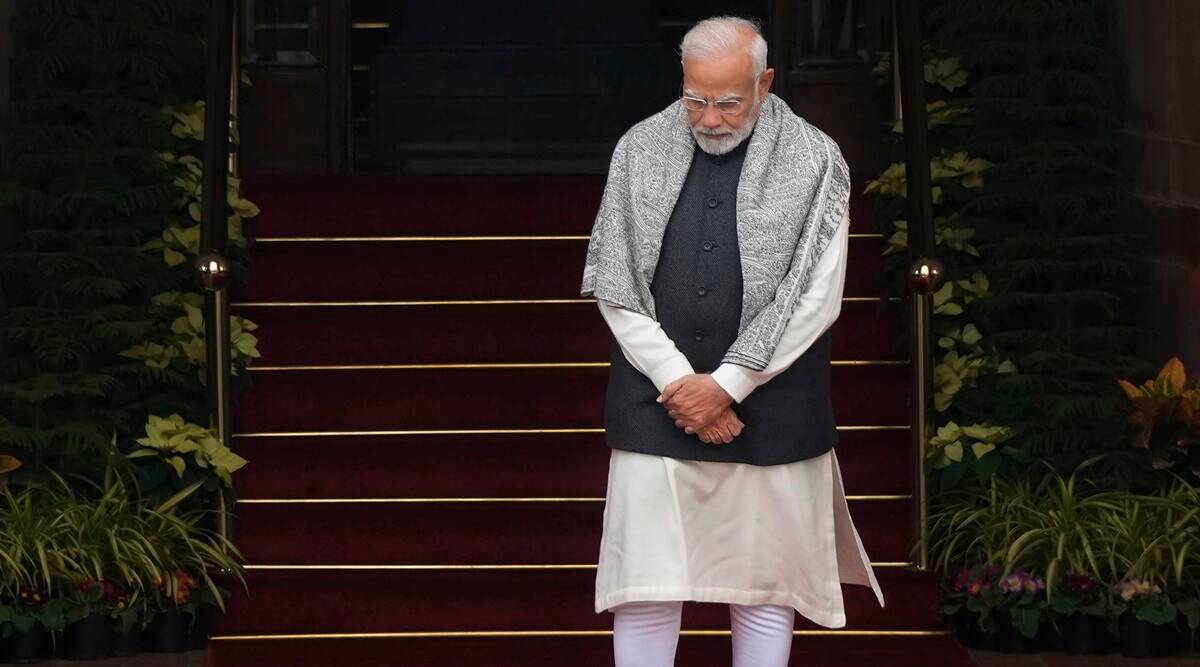THE SUPREME COURT said on Monday that it will hear a PIL contesting the “ban” on the BBC documentary “India: The Modi Question” on February 6. In addition, the court consented to consider a related petition seeking the annulment of “any orders directly or indirectly restricting” the documentary, including a directive from the government “directing Twitter India to prohibit 50 tweets including links to YouTube videos” on it.
Advocate M L Sharma filed the PIL, and he presented it to a bench chaired over by Chief Justice of India D Y Chandrachud. As Sharma pleaded for an urgent hearing, claiming that individuals were being arrested, the CJI made it plain that the matter would be heard on February 6 and warned the counsel, who is a known serial PIL litigant, “you can speak to the social media from somewhere.”
Later, the bench, which also included Justices P S Narasimha and J B Pardiwala, consented to hear the plea filed by journalist N Ram, TMC MP Mahua Moitra, and attorney Prashant Bhushan.
Union Law Minister Kiren Rijiju remarked on Twitter, tagging a news article on a related case, “This is how they spend the precious time of the Honourable Supreme Court, where thousands of citizens are seeking justice dates.”
In another tweet, Rijiju posed the question, “How long can misleading propaganda persist? The matter has been resolved and dismissed by India’s top court. What is the motivation of such individuals? What is their purpose? Is the Supreme Court of India greater than the BBC? India has significantly surpassed this colonial mentality…”
The documentary focuses on Modi and his state government’s reaction to the Gujarat riots in 2002.
The documentary was judged to be “undermining the sovereignty and integrity of India” and to have “the potential to adversely effect” the country’s “friendly relations with foreign governments” and “public order within the country” on January 20.
Sharma’s PIL also requested the annulment of the January 20 order, arguing that it is “illegal, fraudulent, arbitrary, and unconstitutional.” It requested the court to review the evidence and take action against those directly and indirectly responsible for the Gujarat riots of 2002.
The associated petition notes that Bhushan and Moitra tweeted about the documentary on January 19 and January 22, respectively, with links to its URLs. According to the report, Bhushan’s tweet was blocked and the link to the URL supplied by Moitra was withdrawn after the Information and Broadcasting Ministry’s Secretary issued a directive on January 20.
The Secretary issued the directives in his capacity as Authorised Officer under Rule 13(2) of The IT Rules 2021, the document stated, adding that this is prima facie illegal since the directives “contravene directly” an interim order issued by the Bombay High Court.
In a related argument, the petitioners asserted that the government has not formally released any document/order or other information “that explains the reasons for the necessity to utilise its emergency powers… as opposed to any other procedure allowed by the regulations.” According to the report, the Ministry “preferred expediency over necessity and proportionality in its response to the documentary.”
It was stated that the “contents of the BBC documentary and the tweets by Bhushan and Moitra are protected by Article 19(1)(a) of the Constitution, which guarantees freedom of speech and expression.”…
“The contents of the documentary series are not subject to any of the restrictions contained in Article 19(2) or Section 69A of the Information Technology Act of 2000,” it stated.
The petitioners said that the Supreme Court had previously “declared clearly that criticism of the Government or its policies or even the Supreme Court’s ruling… does not constitute a violation of India’s sovereignty and integrity.”
“As the right to freedom of speech and expression includes the right to receive and disseminate information, all citizens, including the press, have the fundamental right to observe, form an informed opinion, critique, report on, and legally distribute the documentary’s contents,” it stated.
It stated, “The Executive’s censorship of petitioners’ freedom of speech and expression through opaque orders and proceedings is manifestly arbitrary, as it frustrates petitioners’ fundamental right to effectively seek judicial review of administrative actions under Articles 226 and 32 of the Constitution…in violation of the Basic Structure…”
